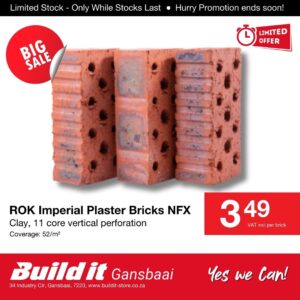In the world of construction, building materials play a vital role in determining the structural integrity and aesthetic appeal of a project. Bricks and masonry materials have stood the test of time as popular choices, offering both durability and timeless beauty.
In this article, we will delve into the various types of bricks and masonry materials, discussing their advantages and disadvantages, to help you make informed decisions when planning your construction project.
Types of Bricks
Common Bricks
Common bricks, also known as traditional bricks, are the most widely used in construction. They are made from clay and offer good strength and insulation properties. However, they may lack the unique appearance some modern builders seek.
Facing Bricks
Facing bricks are designed for their aesthetic appeal. They come in various colours, textures, and sizes, allowing builders to create eye-catching facades. These bricks are often used for visible parts of a structure.
Engineering Bricks
Engineering bricks are known for their high compressive strength and low water absorption, making them suitable for load-bearing applications. They are often used in areas where durability and structural integrity are essential.
Fire Bricks
Fire bricks are specifically engineered to withstand high temperatures. They are commonly used in fireplaces, kilns, and furnaces. Their ability to resist heat makes them crucial for applications where other bricks would deteriorate.
Types of Masonry Materials
Concrete Blocks
Concrete blocks are versatile and cost-effective masonry materials. They come in various sizes and shapes and are used for both load-bearing and non-load-bearing walls. They offer good insulation and durability.
Stone
Natural stone is renowned for its timeless beauty and durability. It can be used for both structural and decorative purposes, providing a unique and rustic appearance. However, it can be costly and labour-intensive to install.
Clay Bricks
Clay bricks, similar to common bricks, are well-suited for both structural and decorative purposes. They offer excellent insulation and are environmentally friendly. Their aesthetic appeal and durability make them a popular choice. W currently have a promotion on Claytile NFX Bricks, visit us in-store today.

Benefits of Bricks and Masonry Materials
Durability: Bricks and masonry materials are renowned for their longevity. They can withstand weathering, pests, and the test of time, making them a sound investment.
Aesthetic Versatility: These materials come in various colours, textures, and shapes, providing architects and builders with a wide range of design options.
Fire Resistance: Many brick and masonry materials exhibit excellent fire resistance properties, enhancing the safety of a building.
Energy Efficiency: The thermal mass of these materials can help regulate indoor temperatures, reducing the need for heating and cooling.
Sustainability: Some masonry materials, like clay bricks and natural stone, are eco-friendly and can be recycled or repurposed.
Drawbacks of Bricks and Masonry Materials
Cost: Quality bricks and masonry materials can be relatively expensive, which may increase the overall cost of a construction project.
Labor-Intensive Installation: Stone and some brick types require skilled labour for installation, increasing labour costs.
Weight: Masonry materials are heavy, necessitating strong foundations and potentially limiting their use in certain construction projects.
Bricks and masonry materials continue to be integral components of the construction industry. They offer an excellent combination of durability, aesthetic appeal, and environmental benefits. By understanding the various types of bricks and masonry materials, along with their advantages and disadvantages, you can make informed choices that best suit your construction project’s needs.
Whether you’re prioritizing aesthetics, structural integrity, or energy efficiency, bricks and masonry materials have a place in your construction toolkit. Visit “Build it Gansbaai” to explore a wide selection of these materials for your next project. Contact us today for a quote: https://www.buildit-gansbaai.co.za/get-a-quote/
Pop into your local Build it Gansbaai today, for building materials, do-it-yourself home improvement tools, and expert advice. Or log on to our online store, and shop from the comfort of your home: www.buildit-store.co.za.
Follow us on social media, to stay up to date with our latest sizzling specials and promotional offers!
Build it Gansbaai/Hermanus offers added value services in respect of hardware retailing; embracing all activity within the building materials industry, focusing specifically on the building of; urban, township, rural housing as well as all home improvements and do it yourself.
